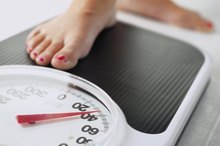Does Your Metabolism Increase When You're Pregnant?
During pregnancy, your body undergoes a number of physiological changes, including alterations in hormone levels and an increase in blood volume. Your metabolic rate also often rises slowly over the 40 weeks of pregnancy, increasing your calorie needs. Talk to your doctor for personalized diet recommendations.
Pregnancy and Metabolism
Metabolism refers to the amount of energy -- calories -- required to perform the physical and chemical processes in your body, including breathing, digestion and physical activity. In general, a woman's metabolism increases 15 percent to 20 percent during the course of her pregnancy, according to Patient.co.uk. However, not every woman experiences an increase in metabolism. Changes in your metabolism depend on your pre-pregnancy nutrition and the weight of the baby. If you are underweight when you become pregnant, your metabolism may slow down to conserve energy, according to an article from 2000 published in The American Journal of Clinical Nutrition. If your baby is large, your metabolism may increase to meet the baby's demands.
- Metabolism refers to the amount of energy -- calories -- required to perform the physical and chemical processes in your body, including breathing, digestion and physical activity.
- If you are underweight when you become pregnant, your metabolism may slow down to conserve energy, according to an article from 2000 published in The American Journal of Clinical Nutrition.
Calorie Needs
Caloric Requirements for the Bedridden
Learn More
The number of calories you need to eat during your pregnancy reflects your metabolic needs and varies from trimester to trimester. Calorie needs during pregnancy generally range from 2,200 calories to 2,900 calories a day, according to the Academy of Nutrition and Dietetics. If you're at a healthy weight at the start of your pregnancy, you do not need to eat additional calories during the first trimester. To meet the calorie needs of your growing baby, your needs during the second trimester increase by 340 calories a day and during the third trimester by 450 calories a day, says AND.
- The number of calories you need to eat during your pregnancy reflects your metabolic needs and varies from trimester to trimester.
Weight Gain
Whatever your starting weight, you can expect to gain weight during your pregnancy. The amount of weight you need to gain depends on your body mass index, or BMI. A woman with a BMI of 18.5 or less is expected to gain 28 pounds to 40 pounds, a woman with a BMI of 18.5 to 24.9 is expected to gain 25 pounds to 35 pounds, while a woman with a BMI 25 or greater is expected to gain 11 pounds to 25 pounds. Closely monitoring your weight and dietary intake may help you see how your metabolism changes throughout your pregnancy.
- Whatever your starting weight, you can expect to gain weight during your pregnancy.
Meeting Your Calories With Nutrient-Rich Foods
What Is the Average Caloric Intake for a 30-Year-Old Man?
Learn More
While you may get to eat more calories when you're pregnant, it doesn't mean you get to eat more cake and pizza. In addition to those extra calories, your nutrient needs also increase during pregnancy, so you need to eat more nutrient-rich foods. A healthy diet for you and your growing baby should include whole grains, fruits, vegetables, lean sources of protein such as poultry and beans, and low-fat or nonfat dairy.
Related Articles
References
- Patient.co.uk: Physiological Changes in Pregnancy
- American Journal of Clinical Nutrition: Physiology of Pregnancy and Nutrient Metabolism
- MedlinePlus: Metabolism
- Sharma HB, Kailashiya J. Gender difference in aerobic capacity and the contribution by body composition and haemoglobin concentration: a study in young indian national hockey players. J Clin Diagn Res. 2016;10(11):CC09–CC13. doi:10.7860/JCDR/2016/20873.8831
- Brightwell CR, Markofski MM, Moro T, et al. Moderate-intensity aerobic exercise improves skeletal muscle quality in older adults. Transl Sports Med. 2019;2(3):109–119. doi:10.1002/tsm2.70
- American College of Sports Medicine. Protein Intake for Optimal Muscle Maintenance.
- Bellemare F, Jeanneret A, Couture J. Sex differences in thoracic dimensions and configuration. American journal of respiratory and critical care medicine. 2003;168(3):305–12.
- Dilgate Muth, Nathalie, MD, MPH, RD. Do men and women have different nutritional needs? American Council on Exercise. March 21, 2012.
- Lewis D, Kamon E, Hodgson J. Physiological differences between genders. Implications for sports conditioning. Sports medicine (Auckland, N.Z.). 1986;3(5):357–69.
- Protein Intake for Optimal Muscle Maintenance, American College of Sports Medicine, (2015).
Writer Bio
Jill Corleone is a registered dietitian and health coach who has been writing and lecturing on diet and health for more than 15 years. Her work has been featured on the Huffington Post, Diabetes Self-Management and in the book "Noninvasive Mechanical Ventilation," edited by John R. Bach, M.D. Corleone holds a Bachelor of Science in nutrition.









